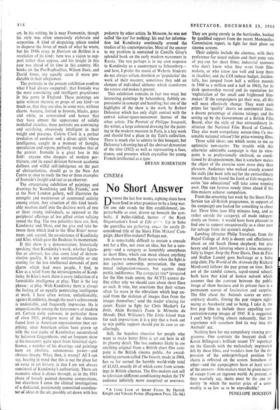No Short Answer
CINEMA DURING the last few weeks, sighting shots have been fired in what promises to be a long war. On one side stands the film establishment, im- perturbable as ever, drawn up beneath the sym- bolic, if bullet-riddled, banner of the Rank Organisation's Look at Life se''-; Up in Soho the guerrillas are gathering, unuer the surely ill- considered title of the Short Film Makers' Cam- paign. Short film-makers? Perhaps not.
It is remarkably difficult to sustain a crusade not for a film, nor even an idea, but for a cate- gory—and a category as lumpishly amorphous as short films, which can mean almost anything you choose to name. Even worse when the fight is not against censorship, persecution, the easy moral indignation-rousers, but against sheer public indifference. The campaign text• (prepared for the film trade union, the ACTT) cannot de- fine either why we should care about short films as such. It tries, but assertions that their virtues often 'lie more in the vibrations which leap un- said from the skeleton of images than from the images themselves,' send the reader wincing for cover. Easier to fight for Chris Marker's La Jetee, Alain Resnais's Toute la Memoire du Monde, Dick Williams's The Little Island than for such imprecision; it is a pity that a book out to win public support should put its case so un- alluringly.
Still, the hopeless situation for people who want to make better films is set out here in all its gloomy detail. The last audience likely to see anything original from a British short film com- pany is the British cinema public. An award- winning cartoon called The Insects, made in 1964, has so far earned the humble world-wide total of £1,623, exactly £6 of which came from screen- ings in British cinemas. The film-makers can sell to television (different conditioning makes the TV audience infinitely more receptive) or overseas.
* A LONG LOOK AT SHORT FILMS. By Derrick They are going sternly to the barricades, backed by qualified support from the recent Monopolies Commission report, to fight for their place on cinema screens.
Their culprits include the cinemas, with their preference for tested tedium and their puny rate of pay-out for short films; industrial sponsors who don't know what they want from film- makers, or who know too well and keep them in shackles; and the COI (whose budget, inciden- tally, has jumped from half a million pounds in 1960 to a million and a half in 1965), for its drab sponsorship record and its reputation for `exploitation of the small and frightened film- maker.' If the campaigners get their way, all this will most effectively change. They want cash prizes for 'quality' shorts on continental lines; a decent percentage of cinema takings; and the setting up by the Government of a British Film Board, after the style of that extraordinary in- stitution the National Film Board of Canada. They also want compulsory screen-time ('a rea- sonable national release') for prize-winning films.
Three solid ideas; one which seems to me an optimistic non-starter. The trouble with this otherwise admirable campaign is that its view- point is so professionally enclosed, so condi- tioned by disappointment, that it somehow makes the object of the exercise seem more duty than pleasure. Audiences who walked crossly around the stalls (the book tells us) for the extraordinary reason that they found the Look at Life magazine series 'too educational' will take some winning over. One can foresee rowdy times ahead if the film-makers achieve compulsion.
From the screening last week by the Short Film Service (an all-British programme, in support of the campaign) one looked for something to cheer for. Three films (one fifty minutes long, and so rather outside the category), all made indepen- dently on 16mm : it would have been pleasant to find one to support unequivocally as a clear case for salvage from the system's neglect.
Lambing (director Philip Trevelyan, from the Royal College of Art) is decent and affectionate about an old South Down shepherd; but also heavy and inert, loitering where it tries meaning- fully to linger. Strip (by Peter Davis, Don de Fina and Staffan Lamm) goes backstage at a Soho strip club; The World of the Animals (by Richard Mordaunt) follows the pop group on tour. Both are of the candid camera, taped-sound school; both have that kind of honest naiveté which assumes that the contrast between the public image of show business and its private face is a permanent source of fascination and surprise. The film about the Animals scores an extra- ordinary double, filming the pop singers sight- seeing at Auschwitz and so being, I take it, the first pop film to include those appalling con- centration-camp images of 1945. It is suggested, I can't help feeling almost indecently, that the experience will somehow find its way into the Animals' act.
Nothing here for my compulsory viewing pro- gramme. One contrasts the buoyant dash of Kevin Billington's brilliant recent TV reportage on -the Guards with the melancholy impression left by these films, and wonders how far the de- pression of the underprivileged position for shorts is reflected on the screen. Somehow or other—and the campaigners have at least some of the answers—film-makers must be given means of escape from an ingrown world. At present, 10 they woefully say, theirs must be the one in- dustry 'in which the market price of a com- modity is so low as to be unprofitable.'






























 Previous page
Previous page